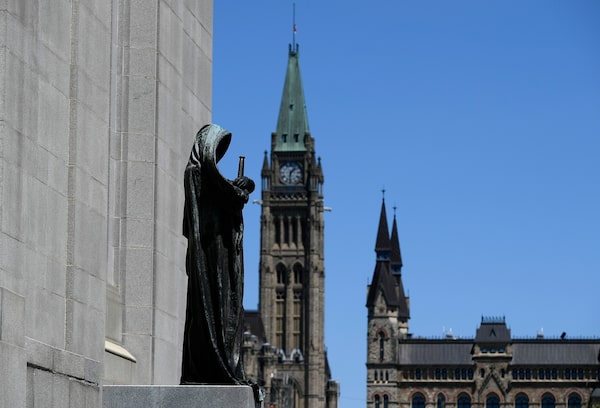
The sculpture of Ivstitia (Justice) at the Supreme Court of Canada, alongside the Peace Tower on Parliament Hill in Ottawa.Justin Tang/The Canadian Press
Janice Stein is the founding director of the Munk School of Global Affairs and Public Policy and the Belzberg Professor of Conflict Management at the University of Toronto.
On June 21, something extraordinary happened in Canada. A senior public servant stood in front of the bar of the House of Commons and was formally “admonished” by the Speaker, pursuant to a motion passed by the House several days before.
Why the admonishment? Iain Stewart, president of the Public Health Agency of Canada (PHAC), failed to comply with two separate motions of the House of Commons ordering him to produce sensitive documents on the dismissal of two researchers from Winnipeg’s high-security National Microbiology Laboratory. In an effort to break the deadlock, the attorney-general of Canada has now invoked a process under Section 38 of the Canada Evidence Act that, in accordance with the law established by Parliament for just these kinds of situations, asks the federal court to rule on whether the information, if disclosed, would be injurious to national security.
Why did Mr. Stewart refuse to hand over the unredacted documents? To describe his refusal to hand over the documents as obstruction is unfair and ignores the legal context in which senior public servants operate. Mr. Stewart explained that he had received legal advice from officials in the Department of Justice that disclosure to parliamentarians who do not have the appropriate security clearances could imperil national security. He therefore refused to hand over the documents because to do so would require him to violate the law. A civil servant of unimpeachable integrity with a reputation for the highest level of competence, Mr. Stewart stood before the bar of the House rather than knowingly break the law and violate his responsibilities.
Parliamentarians have undermined their own security and intelligence committee
They called the wrong guy to the bar
The Speaker insisted that Parliament has constitutional powers to order the production of any document – that it is the will of the House of Commons, as expressed by a motion of the House of Commons, that it is supreme. The Speaker said that he intends to vigorously defend the sovereignty of Parliament, a foundational principle of our democracy, and its unfettered right to demand documents in the upcoming hearing before the federal court.
A stand-off between the executive and legislative branches of our government that they were unable to resolve. Over to the courts. The stakes are high. What happens when “the will of Parliament,” as expressed in a motion of the House, conflicts with Parliament’s duly enacted and promulgated legislation?
According to the Speaker, it is the “motion” that takes precedence.
The House of Commons passes legislation pertaining to national security, or criminal law, or taxation, or privacy, or telecommunications or electoral laws. Can a motion of the House of Commons, in fact, override that legislation? Not likely. Certainly not on questions of rights guaranteed by the Charter. Even on issues that are not specifically related to the Charter, we expect Parliament not only to pass a motion, but to enact new legislation that deals with the substance of the motion. And to bind Parliament in the Act just as it may bind the Crown.
If that were not the case, then we would no longer be a nation under the rule of law.
On closer reading, the Speaker seems to be making a more limited claim. He is arguing that Parliament has an unfettered right to demand documents of the executive. Here’s where the rubber hits the road. The civil servant who was asked to provide documents to parliamentarians who don’t have security clearance had received legal advice from officials, not political appointees, that surrendering the documents unedited would be violating the law.
How might this be resolved? Other parliamentary democracies manage this kind of conflict. One way is through the courts. The Attorney General has asked for – and the court will now provide – clarity on the Speaker’s claim that Parliament has the absolute and unfettered right to demand documents. But could an appeal to the courts have been avoided?
In Canada, we have a National Security and Intelligence Committee of Parliamentarians (NSICOP) whose members do have security clearances, but it does not report to Parliament. It reports to the Prime Minister, who decides what information can be made public. That committee acts inside the executive and that is why it gets access to top secret code word documents. PHAC provided all the unedited documents to NSICOP, but the Speaker and the Opposition rejected this solution.
If there had been greater goodwill, members of the Canada-China committee, along with the law clerk of Parliament, might have been given a time- and scope-limited security clearance and, working with national security officials, reviewed the documents to decide on what should be edited before the documents were shared. A version of that offer was made to Parliament but was rejected.
So the two branches of government find themselves in court. While we wait for a ruling, Canadians can take pride in our democracy. Parliament is standing up vigorously for what it believes are its sovereign rights. And a senior public servant behaved with courage and dignity as he defended his refusal, as an official of the Government of Canada, to break the law of the land. Pretty good when in many places around the world democracies are crumbling under pressure.
Keep your Opinions sharp and informed. Get the Opinion newsletter. Sign up today.